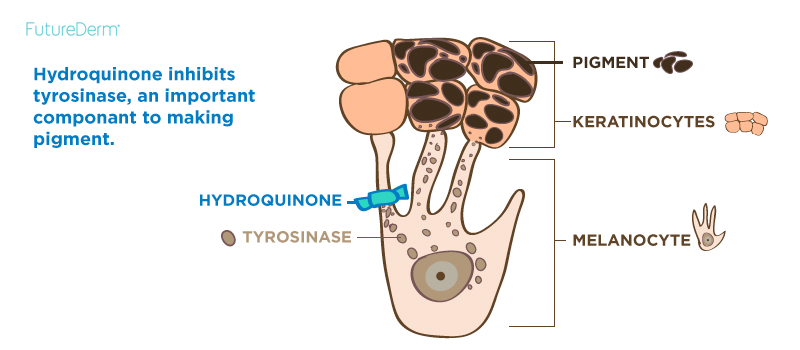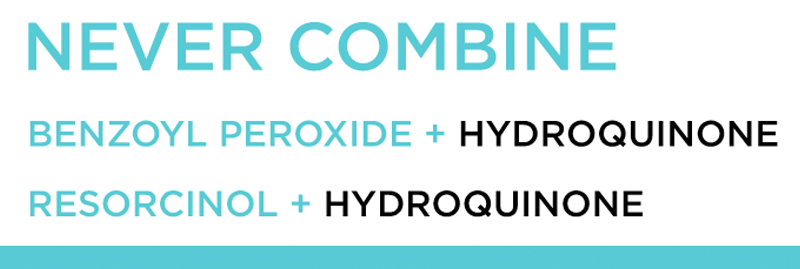I LOVE TRETINOIN (RETIN A) WITH A LITTLE HYDROQUINONE WHEN MY MELASMA GETS CRAZY
I’ve also provided my patients with numerous Retin A and/or HQ prescriptions over the years, helping them integrate it into their skin care treatments. If you can deal with a little dryness for a little while, you will reap the benefits.
My patients are always looking for the best anti-aging trick out there. You simply cannot beat Vitamin A (Tretinoin, Retina A) along with Vitamin C Serum for anti-aging magic. If you have melasma and/or sun damage, our pharmacy can compound a little hydroquinone along with it, and you’re golden.
WHAT IS THE BEST TREATMENT FOR MELASMA? RETIN-A + HYDROQUINONE
Hydroquinone has been, and continues to be the gold standard in the treatment of melasma, brown patches on the face and other parts of the body that are exposed to the sun, and other skin discoloration due to its effectiveness and safety. Again, this combines with a little Vitamin A (Tretinoin, Retina A) and you’ve got a powerful cocktail for cell turnover and bright skin.
There is so much evidence that Vitamin A (Tretinoin, Retina A) 0.025%, 0.05% 0.1% cream can improve some of the signs of sun damaged skin. The only adverse effects associated with this treatment are skin irritations and mild peeling. Hydroquinone can be an effective product for reducing the appearance of areas of discolored skin if used under the proper guidance of a skin care specialist. Both are available on private prescription from our office with a consultation, provided you are a good candidate.
MY INSURANCE WON’T COVER RETIN-A or HYDROQUINONE. HOW MUCH IS IT?
Most insurance companies won’t cover this because they know it is for cosmetic purposes. The other day a pharmacist at CVS told me “Ms. Gunn, Blue Cross won’t cover this unless you are under the age of 40.” Well, you sure know how to make a girl feel good… lol
I am a strong believer in supporting local Austin businesses, so I use People’s Pharmacy for compounding the best Hydroquinone and/or Retin A you can find. I just had mine filled, and it was around $75 dollars for a 60-90 day supply. Some places will have the prescription creams delivered to them, and then double the price for the patient. Be careful!
TRICKS FOR USING HYDROQUINONE & RETIN A CREAM CORRECTLY
- Always apply it to your skin at bedtime, never use it during the day.
- Never apply it at the same time you also have products on your skin that contain glycolic acid or benzoyl peroxide.
- Always wait at least 15-30 minutes after washing your skin before you apply your anti-aging cream. I personally keep my tube of tretinoin on my bedside table and read a little to pass the time before I apply it.
- You MUST apply cream at least once every 72 hours, or you are starting from the beginning.
- Start tretinoin therapy by using the product twice a week (every third night) and slowly increase to every night over a month or two as your skin adjusts.
- A little scaliness and irritation is normal at first, but if the treated skin becomes really sensitive, back off and wait. Let the skin return to normal then begin treatment again. Slowly try to increase to every night as your skin adjusts.
- Apply a ‘pearl-sized’ portion to the face. Use the same amount for the neck and/or chest.
- If your skin becomes red and irritated for any reason (eg. wind burn, sun burned, harsh skin care products, surgical or cosmetic procedures etc.), don’t apply tretinoin until your skin has entirely returned to normal.
STILL NOT CONVINCED?
- Vitamin A (Tretinoin, Retin A) has proven itself to reduce, reverse, and prevent wrinkles. The younger a person starts (teens and twenties), the more benefit they receive, but it’s never too late!
- It helps lighten and prevent age spots.
- It builds collagen to thicken and increase the structural strength of treated skin.
- It helps to decrease a person’s risk of developing skin cancer.
- Skin just looks better and younger when using Vitamin A (Tretinoin, Retin A).
HOW DOES HYDROQUINONE WORK?
 Hydroquinone works by inhibiting the enzyme tyrosinase, which is important in skin melanin (pigment) development. As long as you continue to use hydroquinone, you will inhibit tyrosinase, and hence pigment production.
Hydroquinone works by inhibiting the enzyme tyrosinase, which is important in skin melanin (pigment) development. As long as you continue to use hydroquinone, you will inhibit tyrosinase, and hence pigment production.
INTERESTING FACT: Hydroquinone is common in foods such as cranberries, blueberries, pears, beans, tea, coffee, red wine, beer, broccoli and onions and is therefore ever present in humans.
WILL MY SKIN TONE STAY EVEN AND LIGHTENED FOREVER WITH HQ?
Unfortunately, when you discontinue use of hydroquinone, your skin’s natural supply of tyrosinase will no longer be inhibited. Slowly but surely, your skin’s natural pigmentation will return. I tell my patients make sure you are religious about sunscreen, and keep those sun spots away!
ARE THERE ANY SIDE EFFECTS TO HYDROQUINONE | RETIN A ON DARKER SKIN TYPES?
In darker-skinned patients, continued hydroquinone use has been associated with ochronosis, a darkening of the skin. It has been proposed this occurs because hydroquinone inhibits an enzyme called homogentisic acid oxidase within the skin, which in turn causes the dark-colored homogentisic acid to build-up within the skin with continued use. Interestingly enough, this phenomenon has only been documented in darker-skinned patients.
This issue with darker skin use is a well-documented occurrence with combined use of products containing resorcinol and hydroquinone. Hundreds of ochronosis cases have been documented from using resorcinol/hydroquinone combination treatments in South Africa before 1984 (Journal of Dermatological Treatment, 1997).
CAN YOU USE HQ AND RETIN-A | TRETINOIN DAILY?
To be on the safe side, I always recommend using hydroquinone in four-month cycles, alternated in the off months with other milder tyrosinase inhibitors, such as products containing azelaic acid, kojic acid, and arbutin.
I am coming out with my own perfect form of Retinol (in my humble opinion) in just a couple of weeks. Make sure the one you choose is not in a tub, jar-type container. To be frank, the retinol is rendered virtually worthless with full air exposure in the open-top jar container.
HEADS UP! DO NOT USE IT IF YOU USE THESE:

Do NOT use any products containing resorcinol while you are using products containing hydroquinone.
Do NOT use any products containing benzoyl peroxide when using HQ
Do NOT get hydroquinone anywhere near your eyes. Pigmentation of the eye and permanent corneal damage can occur when the eye is directly exposed to hydroquinone.
KEYWORDS: Melasma, Austin, Sun Damage, Brown spots, Age spots, Skin tone, Skincare, Kristin Gunn
